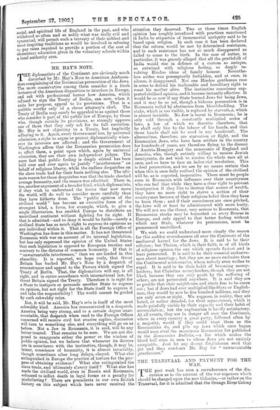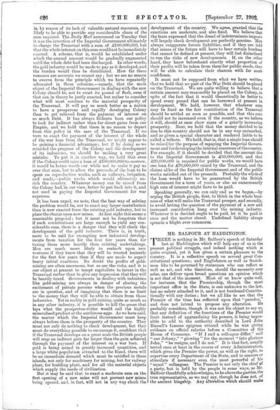THE TRANSVAAL AND PAYMENT FOR THE WAR.
T"past week has seen a recrudescence of the dis- cussion as to the amount of the war expenses which should be charged upon the new Colonies,—or rather on the Transvaal, for it is admitted that the Orange River Colony is, by reason of its lack of valuable natural resources, not likely to be able to provide any considerable share of the sum required. The Daily Mail announced on Tuesday that it was the intention of the Imperial Government ultimately to charge the Transvaal with a sum of £100,000,000, but that the whole interest on this sum would not be immediately exacted. A scheme, that is, would be established under which the annual amount would be gradually augmented until the whole debt had been discharged. In other words, the gold industry would be made to pay as it developed, and the burden would thus be distributed. How far these rumours are accurate we cannot say ; but we see no reason to swerve from the principle which we have repeatedly advocated in these columns,—namely, that the main object of the Imperial Government in dealing with the new Colony should be, not to exact its pound of flesh, even if that can in theory be justly exacted, but rather to consider what will most conduce to the material prosperity of the Transvaal. It will pay us much better as a nation to have a prosperous and rapidly developing Colony than to get relieved from the payment of interest on so much Debt. It has always hitherto been our policy to look for indirect rather than for direct gains from our Empire, and we hold that there is no reason to depart from this policy in the case of the Transvaal. If we were to exact the payment of the interest of the whole of the war loan from the Transvaal, we might appear to be gaining a financial advantage ; but if by doing so we retarded the progress of the Colony and the development of its industries, we should be making a very great mistake. To put it in another way, we hold that even if the Colony could raise a loan of £100,000,000 to-morrow, it would be better worth our while not to make it pay us over that sum, but to allow the proceeds of the loan to be spent on reproductive works, such as railways, irrigation, and roads,—public works which would ultimately en- rich the country. Whatever money can be raised from the Colony had, in our view, better be put back into it, and Trot used in paying the Imperial Government for war expenses.
It has been urged, we note, that the best way of solving the problem would be, not to exact any larger contribution than is now exacted from the existing gold industry, but to place the charge upon new mines. At first sight this seems a reasonable proposal ; but it must not be forgotten that if such contributions are large enough to yield any con- siderable sum, there is a danger that they will check the development of the gold industry. There is, in truth, more to be said for exempting new industrial develop- ments from taxation for the first few years than for taxing them more heavily than existing undertakings. Men are much more likely to embark upon new ventures if they know that they will be treated leniently for the first few years than if they are made to expect heavy initial exactions. No doubt the profits of gold- mining are often enormous, but so are the risks, and it is our object at present to tempt capitalists to invest in the Transvaal rather than to give any impression that they will be heavily taxed. Governments in dealing with industries like gold-mining are always in danger of sharing the excitement of private persons when the precious metals are in question, and of imagining that there is no limit to the money that they will be able to obtain from those industries. Yet in reality in gold-mining, quite as much as in any other industry, it is possible to kill the goose that lays what the prospectus-writer would call the highly mineralised product or the auriferous eggs. As we have said, the matter which the Imperial Government must keep always before them is the prosperity of the country. They must not only do nothing to check development, but they must do everything possible to encourage it, confident that if the Transvaal develops on a °Teat scale the British people will reap an indirect gain far larger than the gain achieved through the payment of the interest on a war loan. If gold is being mined in greatly increased quantities, and a large white population attracted to the Rand, there will be an immediate demand which must be satisfied in these islands, not only for machinery for mining, but for railway plant, for building plant, and for all the material objects which supply the needs of civilisation. But it may be said that to exact a moderate sum on the first opening of a new mine will not prevent new mines being opened, and, in fact, will not in any way check the development of the country. We agree, granted that the exactions are moderate, and also fixed. We believe that the fears expressed that the dread of indeterminate imposts will largely check development are perfectly genuine. Men always exaggerate future liabilities, and if they are told that mines of the future will have to bear certain 'burdens that cannot be defined at present, they will feel disinclined to run the risks of new developments. If, on the other hand, they know beforehand exactly what proportion of their profits will be taken from them for public needs, they will be able to calculate their chances with far more confidence.
It must not be supposed from what we have written that we hold that no part of the War Debt should be placed on the Transvaal. We are quite willing to believe that a certain amount may reasonably be placed on the Colony, in spite of the fact that it would theoretically be better to spend every pound that can be borrowed at present in development. We hold, however, that whatever sum may be fixed as the fair contribution of the Transvaal should be settled as soon as possible, and that this sum should not be increased even if the country, as we believe it will, should at once show signs of a greatly increasing prosperity. Next, we hold that the money decided to be due to this country should not be in any way earmarked, and so given, a special character and rendered liable to be called a. tribute. We hold, that is, that a single loan should be raised for the purpose of repaying the Imperial Govern- ment and for developing the internal resources of the country. For example, if it should be decided that the amount due to the Imperial Government is £50,000,000, and that £20,000,000 is required for public works, we would have one loan for £70,000,000 raised by the Transvaal, and the claims alike of the Imperial Government and of the public works satisfied out of the proceeds. Probably the whole of the loan would have to be guaranteed by the British Government for a term of years, or else an unnecessarily high rate of interest might have to be paid.
Speaking generally, we can only end as we began,—by urging the British people, first, to think in the whole busi- ness of what will make the Transvaal prosper, and secondly, to avoid letting the question of the payment of a new and increased contribution hang over the mining industry. Whatever it is decided ought to be paid, let it be paid at once and the matter closed. Undefined liability always spreads a blight over commerce.











































 Previous page
Previous page